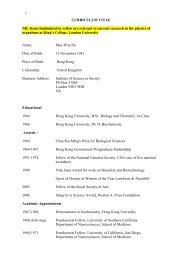Ethiopia goes organic to feed herself - The Institute of Science In ...
Ethiopia goes organic to feed herself - The Institute of Science In ...
Ethiopia goes organic to feed herself - The Institute of Science In ...
You also want an ePaper? Increase the reach of your titles
YUMPU automatically turns print PDFs into web optimized ePapers that Google loves.
"Silicon Valley <strong>of</strong> agricultural<br />
biotech."<br />
Yet the industry didn't retain a<br />
stronghold there: a consumer backlash<br />
against GM food, along with<br />
high-pr<strong>of</strong>ile industry blunders such<br />
as the StarLink contamination incident,<br />
nipped inves<strong>to</strong>r enthusiasm in<br />
the bud. <strong>In</strong> 2000, the Novartis<br />
Agricultural Discovery <strong><strong>In</strong>stitute</strong> was<br />
folded in<strong>to</strong> Syngenta. <strong>The</strong>n in 2002,<br />
Syngenta closed the La Jolla, San<br />
Diego unit. Other San Diego agricultural<br />
biotechs also disappeared.<br />
Mycogen was purchased by Dow<br />
Chemical, and Akkadix Corp. faded<br />
from the scene. Dow retains a<br />
research unit in San Diego, but<br />
moved a second agbiotech unit out<br />
<strong>of</strong> the state.<br />
Biotech medicines a refuge <strong>of</strong><br />
hope<br />
Biotech drugs have long provided a<br />
refuge <strong>of</strong> hope for inves<strong>to</strong>rs wary<br />
about the prospects for agricultural<br />
biotech. <strong>The</strong> promise <strong>of</strong> lucrative<br />
magic bullets against intractable diseases<br />
attracted those who kept faith<br />
in the genetic determinist model <strong>of</strong><br />
illness. Biotech pioneers s<strong>to</strong>ked<br />
inves<strong>to</strong>r enthusiasm by arguing that<br />
since biotech drugs are <strong>of</strong>ten versions<br />
<strong>of</strong> human proteins, genetic<br />
engineering could cut short the long<br />
safety trials that traditional drugs go<br />
through. But that didn't turn out <strong>to</strong> be<br />
the case, and most genetically engineered<br />
medications take 10 <strong>to</strong> 15<br />
years <strong>to</strong> win approval, much the<br />
same as other drugs.<br />
At the turn <strong>of</strong> the millennium,<br />
hopes rose with the hype when the<br />
deciphering <strong>of</strong> the human genome<br />
appeared <strong>to</strong> herald a new age <strong>of</strong><br />
treatments tailored for individual<br />
genetic differences. This sparked an<br />
incredible 170% rise in biotech s<strong>to</strong>ck<br />
prices in just four months - followed<br />
by a steep crash over the next year.<br />
By 2002, disillusionment had set in.<br />
Canadian magazine Maclean's<br />
reported, in an article called<br />
"Biotech hope and hype: <strong>The</strong> genetics<br />
revolution has failed <strong>to</strong> deliver",<br />
"Federal and provincial governments<br />
have long had a love affair with<br />
genetics, pumping billions in<strong>to</strong> the<br />
biotech biz… 20 years later and how<br />
many breakthrough products has<br />
biotech produced? Gene therapy<br />
may actually have harmed more<br />
people than it's helped. … <strong>The</strong> few<br />
drugs derived from GE such as<br />
insulin simply replace existing products<br />
while creating new risks."<br />
Bad-idea virus<br />
We've seen how one lifeline for a<br />
largely unpr<strong>of</strong>itable industry is selling<br />
s<strong>to</strong>cks. Another is public money.<br />
<strong>The</strong> BIO conference, reported<br />
Associated Press, was packed with<br />
mayors and governors from across<br />
the US desperate <strong>to</strong> lure biotech<br />
companies <strong>to</strong> their area with promises<br />
<strong>of</strong> tax breaks, government grants,<br />
even help with parking. Yet biotech,<br />
wrote the AP, "remains a money-losing,<br />
niche industry firmly rooted in<br />
three small regions <strong>of</strong> the country:<br />
'This notion that you lure biotech <strong>to</strong><br />
your community <strong>to</strong> save its economy<br />
is laughable,' said Joseph Cortright,<br />
a Portland, Ore. economist who cowrote<br />
a report on the subject. 'This<br />
is a bad-idea virus that has swept<br />
through governors, mayors and economic<br />
development <strong>of</strong>ficials.'”<br />
A case in point is Florida governor<br />
Jeb Bush, brother <strong>of</strong> president<br />
George W. Bush. Jeb Bush spearheaded<br />
an initiative <strong>to</strong> hand over<br />
$510 million <strong>of</strong> Florida and Palm<br />
Beach County taxpayers' money <strong>to</strong><br />
build a new biotech centre for the<br />
Scripps Research <strong><strong>In</strong>stitute</strong>, based in<br />
San Diego. Land, buildings, labs,<br />
<strong>of</strong>fices, equipment, even employees'<br />
salaries for seven years: Scripps got<br />
it all for free, putting in no money <strong>of</strong><br />
its own. <strong>The</strong> company will eventually<br />
repay Florida up <strong>to</strong> $155 million, half<br />
<strong>of</strong> the state's investment. But the<br />
payback provision will not kick in<br />
until 2011. Bush and other Florida<br />
<strong>of</strong>ficials hope that Scripps will make<br />
Florida a biotech hub - like San<br />
Diego.<br />
<strong>The</strong> wisdom <strong>of</strong> using San Diego<br />
as a model is questionable, given<br />
the industry's record <strong>of</strong> failure there.<br />
But Bush seems blind <strong>to</strong> the risks.<br />
"It's always good <strong>to</strong> have sceptics,<br />
but I like <strong>to</strong> be on the dreaming<br />
side," he <strong>to</strong>ld the press. "It's a lot<br />
more fun on the dreaming side <strong>of</strong> the<br />
road."<br />
According <strong>to</strong> a report prepared<br />
for BIO and released at its annual<br />
convention in San Francisco, at<br />
least 29 states have formal plans <strong>to</strong><br />
woo the biotech industry. Many, like<br />
Pennsylvania, are using money<br />
gained from the global <strong>to</strong>bacco settlement<br />
<strong>to</strong> fund biotech development<br />
projects.<br />
How does this "bad-idea virus"<br />
gain such a hold over so many? <strong>In</strong><br />
an article in Nature Biotechnology,<br />
medical bioethicist Leigh Turner <strong>of</strong><br />
McGill University, Quebec, suggests<br />
that biotech fulfils many <strong>of</strong> the same<br />
needs as religious fanaticism:<br />
"Biotech, in a similar manner <strong>to</strong><br />
many religious movements, has its<br />
charismatic prophets, enthusiastic<br />
evangelists and enrapt audiences.<br />
Like religions, it <strong>of</strong>fers a comforting<br />
message <strong>of</strong> salvation. <strong>In</strong>stead <strong>of</strong><br />
imagining a day <strong>of</strong> rapture when the<br />
dead rise from their graves <strong>to</strong> begin<br />
eternal life, biotech enthusiasts<br />
imagine the era when medical technologies<br />
provide a renewable, largely<br />
imperishable body. … Biotech is<br />
not just an assemblage <strong>of</strong> research<br />
programs and techniques. <strong>In</strong> a scientific<br />
and technological era, biotech<br />
also <strong>of</strong>fers a surrogate religious<br />
framework for many individuals."<br />
Within this framework, it is a<br />
small step <strong>to</strong> the type <strong>of</strong> language<br />
found in the Nuffield Council report<br />
and repeated by biotech 'evangelists'<br />
such as Derek Burke, which<br />
insists on the "moral imperative for<br />
investment in<strong>to</strong> GM crop research in<br />
developing countries". And once that<br />
article <strong>of</strong> faith is swallowed, it is but<br />
another small step <strong>to</strong> appropriating<br />
public money <strong>to</strong> promote and export<br />
biotech <strong>to</strong> the third world under the<br />
guise <strong>of</strong> aid and development programmes.<br />
As private finance for biotech<br />
dries up, the industry is increasingly<br />
turning <strong>to</strong> government <strong>to</strong> provide<br />
investment <strong>to</strong> force the crops the<br />
West doesn't want in<strong>to</strong> Africa and<br />
Asia. <strong>The</strong> British government has<br />
already quietly sunk over £13m <strong>of</strong><br />
public money in<strong>to</strong> such projects via<br />
the Department for <strong>In</strong>ternational<br />
Development during a period <strong>of</strong><br />
intense domestic disquiet over GM.<br />
It has also sunk further money,<br />
along with USAID, in<strong>to</strong> the Nairobibased<br />
African Agricultural<br />
Technology Foundation (AATF) project<br />
<strong>to</strong> push GM crops in<strong>to</strong> Africa.<br />
What is so insidious about this,<br />
as Dr Tewolde Berhan Gebre<br />
Egziabher, the head <strong>of</strong> <strong>Ethiopia</strong>'s<br />
Environmental Protection Authority,<br />
has noted, is that "the moral imperative<br />
is in fact the opposite. <strong>The</strong> policy<br />
<strong>of</strong> drawing funds away from lowcost<br />
sustainable agriculture<br />
research, <strong>to</strong>wards hi-tech, exclusive,<br />
expensive and unsafe technology is<br />
itself ethically questionable. <strong>The</strong>re is<br />
a strong moral argument that the<br />
funding <strong>of</strong> GM technology in agriculture<br />
is harming the long-term sustainability<br />
<strong>of</strong> agriculture in the developing<br />
world."<br />
Nobody should be in any doubt<br />
that the GM lobby's real aim has little<br />
<strong>to</strong> do with <strong>feed</strong>ing the hungry. It is<br />
<strong>to</strong> shore up GM research in the UK<br />
in the face <strong>of</strong> industry's current<br />
retreat, <strong>to</strong> associate the technology<br />
in the <strong>of</strong>ficial mind with the public<br />
interest, and <strong>to</strong> give GM's public<br />
relations campaigns a charitable<br />
face.<br />
SiS











